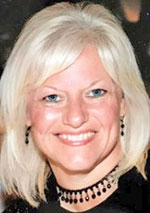Joyful Witness / Kimberly Pohovey
Bottle’s contents lead to thoughts of the legacy we leave
 When we arrived at our destination at a Florida beach condo, we connected with a cousin who was staying next door. She told us she had one heck of a story for us. Intrigued, we asked her to share it.
When we arrived at our destination at a Florida beach condo, we connected with a cousin who was staying next door. She told us she had one heck of a story for us. Intrigued, we asked her to share it.
She was there for more than a month’s stay, and her habit was to walk the beach each morning at sunrise. She often took a bag along in case she found some treasured shells to bring home. As she went about her morning routine, she saw something glinting in the sand. Walking closer, she discovered that it was a message in a bottle. Interested, but still on her walk, she tossed it into her bag and continued.
When she arrived at her condo later that morning, she shared the discovery with her husband, and they decided to open the bottle and try to retrieve the message. Her husband suggested she dump some of the sand from the bottle in order to get to the laminated paper. So, she carefully laid out a towel on the table and poured out the bottle’s contents. Still not able to pull the note from the bottle, she went to a maintenance man to borrow a needle-nose pliers to release the paper.
On one side was a handwritten note with a woman’s name, her birth date and date of her death, as well as a description of her as a fun-loving mother of three boys and an awesome individual. On the back was a collage of photos of the woman with her family, and even her wedding picture. She looked like a loving woman. Someone obviously wanted to remember her and hoped others might learn of her life as well.
Our cousin thought her discovery was so fascinating that she texted friends in a chat to share a picture of the bottle and the story. One of her friends texted back that it (the bottle) was less creepy than a funeral. It was then that she realized the contents she poured out of the bottle was not sand, it was this woman’s cremated ashes. Thankfully, she had kept the poured-out contents.
Not knowing what to do, she put the woman’s remains back in the bottle with the note, sealed it tight and on another morning walk, she returned the bottle to the sea and prayed a decade of the rosary for her.
Since that day, our cousin has shared that story with a few more people. A friend posted it on Facebook and a friend of a friend shared it in Japan. Here I am sharing the story with Criterion readers in central and southern Indiana. Her memory is being spread far and wide.
Who knows who this woman was, how she lived her life, or how she might have wanted to be remembered. Who knows what religion she practiced or what were her beliefs. We don’t know if she had a career or stayed at home raising her family. We have no idea how she died. What we do know is that someone loved her and chose to share her memory in this way.
There are those who are concerned with building a legacy of amassed fortune, powerful positions or praised career achievements. But, when it comes down to it, I think a life truly lived well should only concern who we loved and who loved us.
I can’t imagine wanting anything more when I exit this Earth than to know that during my stay here, I created a legacy of love.
(Kimberly Pohovey is a member of St. Jude Parish in Indianapolis. She is the director of major and planned gifts for the archdiocese.) †
 When we arrived at our destination at a Florida beach condo, we connected with a cousin who was staying next door. She told us she had one heck of a story for us. Intrigued, we asked her to share it.
When we arrived at our destination at a Florida beach condo, we connected with a cousin who was staying next door. She told us she had one heck of a story for us. Intrigued, we asked her to share it.